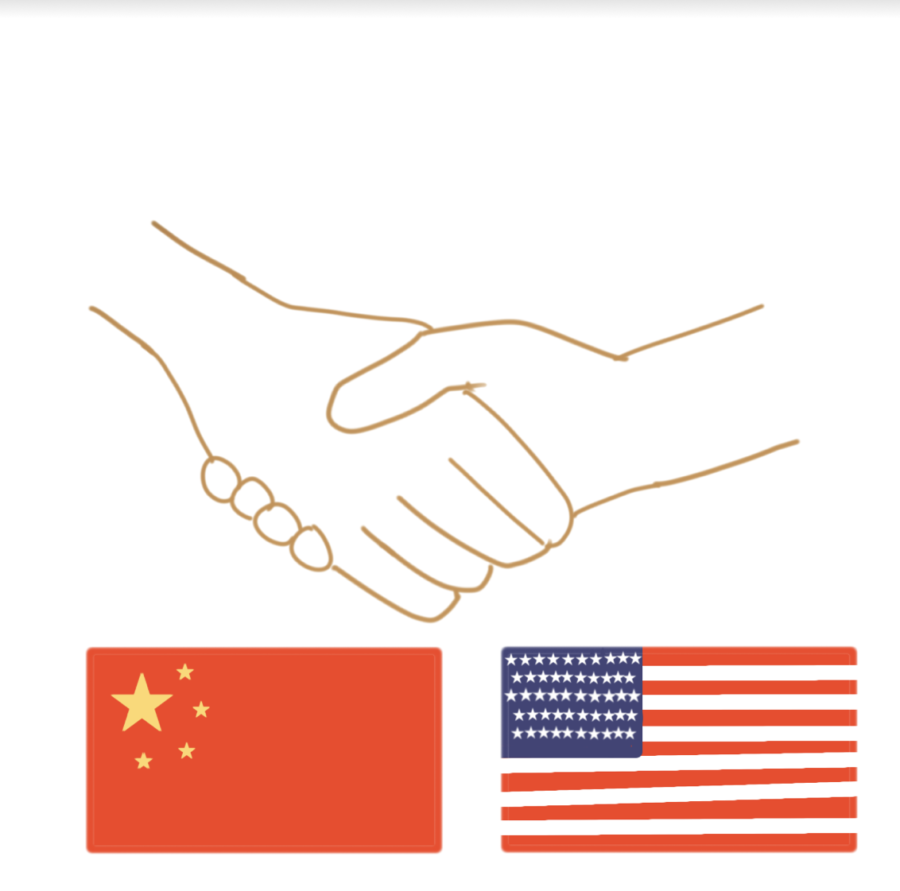Biden-Xi Meeting Sets the Stage for Future Foreign Policy
Biden’s meeting sets an important tone for United States foreign policy, highlighting a change in strategy that is long overdue.
December 21, 2022
The relationship between the United States and China has been adverse and dreadful for the past couple of years. There are numerous reasons why there is so much tension between the two entities, such as conflicting humanitarian and political ideologies and the never-ending struggle to beat each other as global superpowers. In response to this long-standing tension, President Biden demonstrated signs of peace and humility in his recent interactions with the Asian superpower. As there is an important and crucial goal for Biden to de-escalate any unwanted bitterness between the two superpowers. Furthermore, if a physical conflict between the two great superpowers were to occur, it could cause the destruction of the world and the countless tragic deaths that could occur would be devastating.
On Nov. 15, Biden traveled to Bali, Indonesia for a three-hour-long meeting with China’s president Xi Jinping. For the first time ever, the two leaders met face to face and Biden had reportedly gone to this meeting in hopes of keeping an active line of communication between the two countries. However, one factor that contributed to the already dwindling state of affairs between the two was the controversial visit of Nancy Pelosi to Taiwan in Aug. Her visit was for the purpose of symbolizing the support for Taiwan’s sovereignty, which brought a hostile reaction from China as it sees Taiwan as its territory. Fueled by a positive and peaceful outlook, Biden entered the meeting with hopes of settling differences and focusing on uniting against other looming global conflicts.
This is of great importance and is greatly beneficial to Biden’s goal to minimize tensions with China and turn a new leaf of positive diplomacy. It is crucial for the preservation of peace and to prevent any conflicts from escalating into more deadly wars, in light of current events between Russia and Ukraine which, in an agreement, both Biden and Jinping oppose. The two are aware that if China and the United States were to go into a deadly conflict, it will not only affect the two involved, but the whole world would suffer from it. A war between the two would create a global conflict and ultimately end in the demise of everyone.
Fortunately, the two leaders, despite much controversy, agreed on making everything work out under peaceful terms, as Biden and Jinping both desire to prevent further mayhem. It is settled that both would work together to face global problems like climate change and food shortages. This is what all global leaders should be doing; securing and protecting the same soil we stand on in order to create a more cohesive and safe world. After all, global problems harm everyone; it’s only reasonable for everyone to contribute toward their solutions. Science teacher Dr. Karl Kovacs said, “…of course, two heads are better than one…it’s a global problem, so if one part of a globe is promoting one thing and one part of a globe is not, you’re not really acting globally, you’re acting locally.” Clearly, we need a global approach to solve our worldwide problems.
However, it is clear that the competition between the two powers has not changed and that they both plan on preserving the interest of their own countries, even if these interests would cross over one another, which will simply fuel divisions and tensions in the diplomacy between China and the United States. One famously controversial issue discussed during the meeting was the situation regarding Taiwan, in which the United States reinforced its stance supporting the preservation of Taiwan’s sovereignty and independence from China. However, many are skeptical and believe the territory of Taiwan could undermine the diplomatic relations between the two powers. Senior Naheem Thurston said, “Honestly, I am not sure if it might be a dealbreaker, but that definitely would cause some tension for sure…China has been talking about Taiwan…they definitely want to do it.”
At the moment, the discussions between president Biden and president Jinping have ended, but communication is said to be continued by the United States Secretary of State Antony Blinken in early 2023. Biden’s meeting sets an important tone for United States foreign policy, highlighting a change in strategy that is long overdue. Rather than increase aggression, our nation needs to become a global leader in cooperation and peace for the sake of safety and security. For the time being, the two leaders ended the meeting on a positive note, they both desired to rebuild the relationship between the two superpowers as an agreement was made that nuclear warfare should be avoided at all costs. Having China on good terms, Biden hopes to be able to persuade Xi Jinping to corroborate with the prevention of North Korea from performing any nuclear activities.



